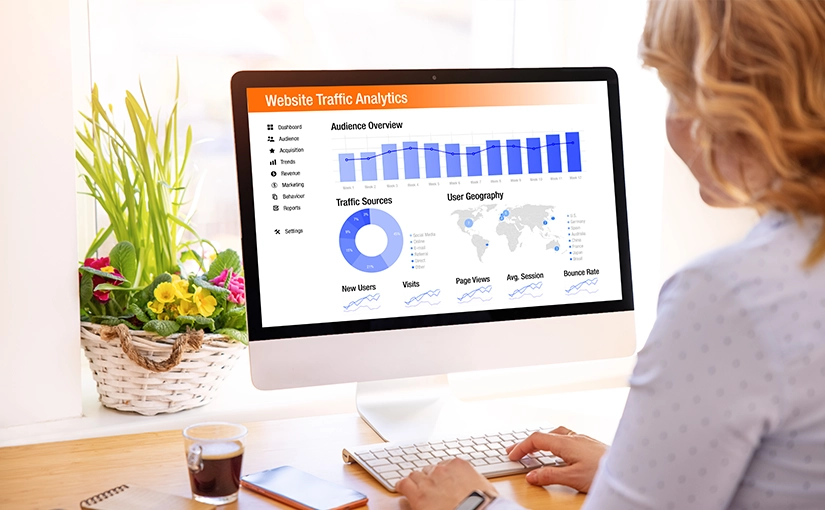How Google Analytics 4 Differs From Universal Analytics
- Posted on : February 14, 2023
-
- Industry : Corporate
- Service : Analytics & Insights Services
- Type: News

The following is an authored article by Cathy Chandhok, Chief Marketing Officer, Infogain, that appeared on PC Quest on 7th February 2023. Read the original news article here.
Earlier this month, I visited Google Academy to get re-certified on Google Analytics, then got a reminder that Universal Analytics will be sunsetting next year. Instead, it will be replaced with Google Analytics 4 (GA4).
Enterprises everywhere are now gearing up for Google Analytics 4 as their cross-platform analytics solution. The analytics tool, introduced by Google in October 2020, offers flexibility to measure many kinds of data across multiple platforms and is built to keep up with the ever-changing data ecosystem.
While the users will be able to retain and access their historical data for a certain period, new data cannot be updated in Universal Analytics after July 2023 (for free version) / October 2023 (for enterprises).
Business users are now digging into the issue: how does GA4 differ from Universal Analytics, and what are its key features and benefits?
Let’s start with the basics. What is GA4?
Google tells us that GA4 is an analytics service designed to address evolving measurement standards. It understands and analyses the complex multi-platform journeys of customers while keeping up with the privacy concerns of today. GA4 can develop valuable insights into consumer behaviors, interactive practices, and user preferences – all powerful tools a business can use to improve, succeed, and meet customer expectations.
For current Universal Analytics users, GA4 is something new to get used to. This may take time, but we may also see significant improvements in easy access to meaningful, actionable marketing insights.
What differentiates GA4 from Universal Analytics?
Data Tracking:
Universal Analytics tracks data from cookies and independent sessions, while GA4 uses an event-based data model. Any interaction can be captured as an event in GA4, while Universal Analytics tracks data through ‘hits’ or sessions.
Cross-device Tracking:
Since several data streams can be grouped into one property in GA4, users can create reports that see cross-device traffic and aggregate data using data streams.
Data Setup Organization – website and apps:
In Universal Analytics, separate properties must be created for the user’s website and app, along with distinct views that make up the steps to process raw data according to one’s specific needs and goals. In GA4, a website or app is considered a data stream and falls under a single property. Each GA4 property can have up to 50 data streams. Thus, the data funneling process is much more straightforward.
User Entity Modeling:
Since websites aren’t the only platforms through which customers interact with businesses, the cookie-based model of Universal Analytics falls short in collecting and tracking data across platforms that do not use cookies. GA4 offers both cookies and Google signals, enabling one to stitch data sets together in a single journey across separate devices. Google signals allow data from users signed into google to fill in the gaps in data due to the lack of cookies.
Engagement Metrics:
Universal Analytics uses the ‘bounce rate’ metric, the percentage of single-page sessions without any interaction with the page. A bounced session has a duration of 0 seconds. GA4 uses a metric called ‘engagement rate,’ which calculates the number of ‘engaged sessions’ that usually lasted longer than 10 seconds, had at least 2 page views, and had a conversion event. The ‘engagement rate’ is more beneficial in measuring the behavior of users, leading to better and more actionable insights.
What are the benefits of GA4?
Understanding Customers Across Touchpoints:
GA4’s event-based measurement model gives users a complete view of the customer’s life cycle instead of being fragmented by independent sessions and the type of platform used.
Improved ROI:
Data-driven attribution helps analyze how marketing activities collectively influence conversions. This analysis can be exported to Google Ads and Google Marketing Platform media tools to further optimize marketing campaigns, subsequently improving overall ROI.
Privacy Compliance:
New country-level privacy controls allow users to better manage and minimize the collection of user-level data while preserving the overall measurement functionality.
Easy Activation of Data Insights:
GA4’s integration of AI and ML capabilities is one of its biggest advantages over Universal Analytics, enabling more sophisticated and predictive insights about user behavior. This enables one to use critical insights to improve marketing for better conversions. Additionally, expanded integration capabilities with other Google products like Google Ads work across the combined web and app data making it much easier to use analytics and insights to optimize campaigns.
Universal Analytics has an end date, so if you haven’t done so already, be sure to set GA4 up now. With GA4, Google has provided yet another great free tool to support data-driven marketing.






